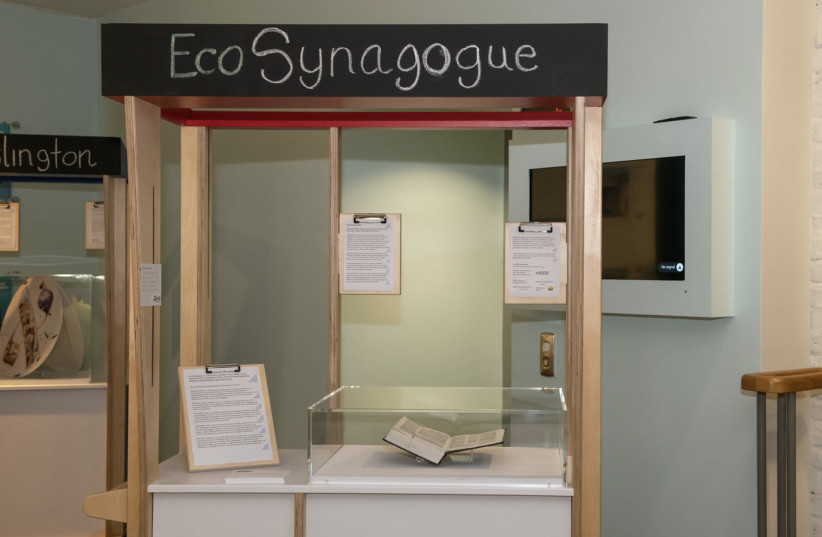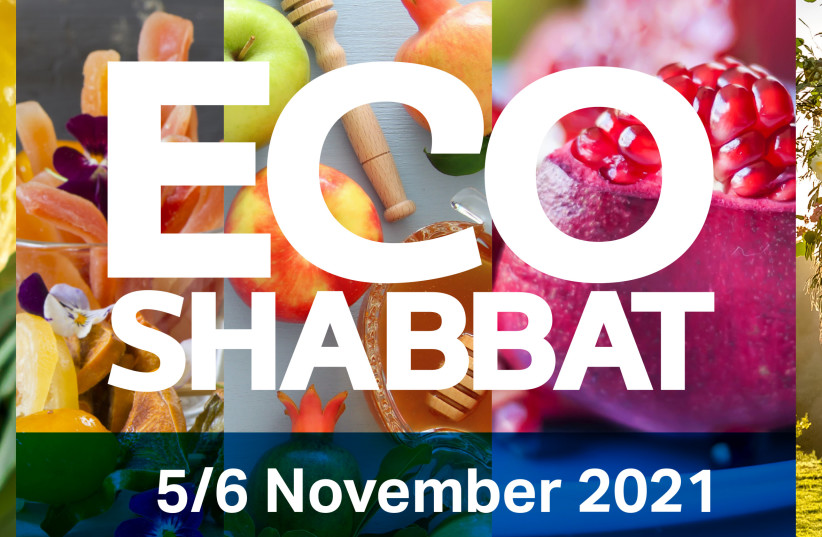When London’s Kol Chai Reform synagogue decided to renovate their building, some members hoped to garner support for the installation of solar panels among the rest of their congregation.
To help them was EcoSynagogue, an organization that encourages environmental sustainability and awareness in the British Jewish community, one synagogue at a time.
Headed by Rabbi Jonathan Wittenberg of the Masorti movement, Rabbi David Mason of the Orthodox United Synagogue union, Rabbi Mark Goldsmith of the Movement for Reform Judaism, and Rabbi Tanya Sakhnovich of the British Liberal Judaism movement, EcoSynagogue’s goals and ideals appeal to all streams of Judaism.
Launched in February 2018, the idea for EcoSynagogue began after Rabbi Wittenberg met environmentalist and founder of EcoChurch Ruth Valerio, at an interfaith retreat.
“I was taken with how there is an audit for everything in the church, in all aspects... how they treat food, to teaching and their communities. I asked if this could be translated into the Jewish way of living,” he recalled. “The [COVID-19] lockdown interrupted us but EcoSynagogue continued to develop on its own, and we still have a close relationship with EcoChurch, and the multifaith voice is significant.”
EcoSynagogue’s primary aim is to encourage all synagogues to register for, and participate in, their Environmental Audit.
There are five categories of the Environmental Audit: community; prayer and teaching; lifestyle; land, building and consumables; and community and global engagement.
A synagogue participating in the audit must have an environmental policy in place, and the congregation’s leadership, including the rabbi, will have made formal commitments to improve the environmental credentials of their synagogue. This may include: delivering lectures on environmental issues during service, incorporating environmental awareness as a teaching theme in childhood education and youth work, and encouraging members to take measures to reduce their personal carbon footprints.
According to EcoSynagogue’s founders, the need for action in Jewish communities arose because “the climate crisis is not simply a technological problem to be resolved through better science. It is a moral and spiritual crisis in our relationship with the earth.
“Judaism understands us not as masters, but as trustees, of God’s creation. We have a primary responsibility to care for the earth and leave it to our children in a state of wholeness and health,” their mission statement says.
RABBI WITTENBERG expanded on the organization’s beliefs, speaking about his love for nature and Judaism, and the points at which they intersect and overlap. “I have always had a deep love of nature and a passion for the environment and the crossover between the environment and Judaism is significant,” he said.

In terms of specific commandments, ba’al tashchit (do not destroy/waste), tzar ba’alei chaim (do not harm a living animal), and the cycles of shmita, all serve to show the importance of environmentalism in Judaism, Rabbi Wittenberg added.
In February 2018, following the launch of EcoSynagogue, Rabbi Wittenberg blogged about his hopes for his new movement.
“We must now look urgently at what has to be done in our synagogues... I feel ashamed at what sometimes goes into bin bags after kiddush. My plan is to stop this practice, and soon. I want to end the use of products that are cruel to animals, bad for the environment or produced in exploitative ways. I want to emulate what is now widely practiced by churches and synagogues in the US: the creation of close ties with local farmers or growers,” he wrote.
Indeed, since he expressed his hopes almost three years ago, congregations across the UK have taken them to heart.
Muswell Hill Synagogue, led by Rabbi Mason, has taken significant steps to ensure that their community follows the Environmental Audit as closely as possible. Judith Devons, the EcoSynagogue leader for Muswell Hill Synagogue, outlined some of the changes her congregation had made since the launch of the movement.
“We have been plastic-free since September 2019. We have factored ecological guidelines into our building plans, for example, getting a rapid steam dishwasher,” she explained.
“We are buying more fresh food in season – locally grown, as much as possible. To minimize food waste we have issued some updated guidelines for kiddushim quantities.”
Other steps the community has taken include giving food to those in need, placing color-coded recycling bins around the building, and providing weekly eco tips to congregants in their online newsletter.
“The [climate] emergency is largely still an abstract concept [for us]. We are cushioned and protected – for now. We don’t have to worry about our food supplies – often flown from afar and appearing ready packaged on the shelves of our local supermarkets,” she said.

She stressed the importance of her own community becoming more eco-friendly. “We don’t have to come face to face with the decimation of rain forests as we continue to protect and enjoy our closest natural environments. But the climate emergency is a reality for people who live according to the rhythms of nature, in symbiosis with their environment – like our biblical forefathers,” she said. “There are 370 million indigenous peoples whose lives have been ruined by exploitation of the land.”
THE KOL CHAI Synagogue first approached EcoSynagogue earlier this year for help to build support within their congregation for the installation of solar panels, as part of the building’s refurbishment plan.
“The key to obtaining approval for the installation of the solar panels was to build support within the community on measures to reduce Kol Chai’s environmental impact, and also showing the financial benefit to the community,” recalled Michel Collins, a member of the community’s Green Group.
“We held a series of events, including a well attended Green Debate, which generated a lot of interest within the community, and resulted in a large number of people joining the group. We also held a Green Shabbat, and various Zoom meetings, in order to [pursue] our agenda.”
After gaining support from an environmental perspective, the group reassured doubtful community members that the visual impact of the solar panels would not be significant, that maintenance would be minimal, and that suppliers would be reliable.
Collins said that the proposal showed that not only did the solar panels prove to be beneficial from an environmental standpoint, but from an economic one too.
“Our building does not have a gas supply, so our electricity usage is high; solar power offered significant savings,” he explained. “The approximate installation cost of £10,500 (roughly NIS 46,200) is expected to be recovered within 10 years, and the estimated electricity bill savings over 25 years is forecast at approximately £45,000 (around NIS 198,300).”
Similar projects have been initiated with the help of EcoSynagogue. After the United Synagogue’s Ruislip Synagogue adopted the Environmental Audit, the congregation calculated that it would be financially beneficial to install a lower ceiling to reduce heat loss.
WITH AN estimated 40 synagogues across the UK currently participating in the Environmental Audit, EcoSynagogue, in partnership with the Board of Deputies of British Jews, looked to expand even further, taking on the 26th UN Climate Change Conference of the Parties (COP26), running between October 31 and November 12, in Glasgow. On Tuesday, November 2, EcoSynagogue operated a stall at COP26, having been selected from among 4,000 hopeful applicants.
“It’s very positive that the Board of Deputies and EcoSynagogue have this physical presence at COP26,” said board president Marie van der Zyl.
“By the Jewish community being out in force, alongside other voices from civil society and fellow faith communities, we are joining together to send a clear message to the COP negotiators: the world is watching, and we are united in our need for you to succeed. It’s no exaggeration to say that the future of the planet depends on what world leaders agree in Glasgow.”
To spread awareness in the UK’s Jewish community ahead of the conference, EcoSynagogue hosted a Carbon Zero event at The Jewish Museum in Camden, London earlier in October. The event, “Carbon Zero, if not now, when?” was hosted by the EcoSynagogue rabbinic team, as well as Chief Rabbi Ephraim Mirvis, and van der Zyl. The event explored why Jewish communities should be engaged with the climate emergency, and the ways Jewish communities in the UK and abroad are engaged in environmental initiatives.
During the gathering, the chief rabbi stressed the importance of climate action. “What I do in my kitchen in my home makes all the difference to the entire world,” he said. “No one is an island, no one can say this has got nothing to do with me, and I don’t have to bear responsibility.
“We have to bear the responsibility individually and collectively for this horrifying situation which threatens our world and threatens our grandchildren and our great-grandchildren. They are the ones who [will] be directly affected in a most serious way.”
Also addressing the issue as a matter of religious obligation and urgency was Rabbi Wittenberg, who believes Judaism sees environmental awareness as an imperative.
“Yesterday we read the portion of Noah in the Torah in which God promises a covenant between God, humanity, and all life on earth,” Rabbi Wittenberg said. “We are the middle party in that covenant, and now is perhaps the most urgent time in the history of humanity to play that role of partnership and interdependence with all living things.
“Judaism teaches us ‘v’shinantam levanecha – you should teach your children [the Torah].’ But there won’t be a Torah to teach our children if there isn’t a world in which they can live.”
BESIDES RUNNING a stall during COP26, EcoSynagogue is holding an EcoShabbat. On November 5-6, participants are encouraged to cook vegan Shabbat meals and plan their preparation in a more sustainable way – for example by using eco-friendly dish soap, reusable dishes, and replacing aluminum foil and plastic wrap with alternative zero-waste options. The organization has also provided resources for children in order to include them in the process and educate them about the issues.
“The issue of climate change is of critical importance but, sadly, it has often been regarded as a fringe issue by the mainstream of our community – a ‘nice to have’ rather than the absolutely crucial discussion it is,” van der Zyl said.
“Through our [the Board of Deputies’] partnership with EcoSynagogue, I believe we’ve started to change people’s minds. In recent months, more synagogues – of all denominations – are becoming EcoSynagogue members, and making significant changes for the better.
“The global conversations around COP26 have had an impact on people, but I truly believe that the leadership shown by leading rabbis – of all denominations – has been a vital aspect of this transformation. Protecting the planet for future generations isn’t just the right thing to do, it’s the Jewish thing to do.”
